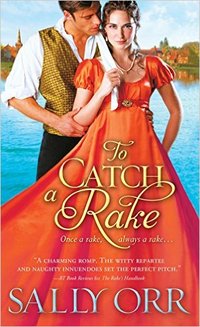Welcome.
Let’s discuss one of our favorite types of heroes—the rake.
The word rake came into use during the Restoration as a wealthy, fashionable gentleman of promiscuous and dissolute habits. The most famous rake of this time is the rake in a series of engravings done in 1735 by Hogarth called, The Rake’s Progress. These pictures document the rake’s progressive deterioration by womanizing and all around self-indulgence.
From the 19th century to today, we use the term to define a ladies’ man and more than likely a libertine. There is a multi-volume set of books written in 1825 called, The Lives of the Rakes, by Edwin Beresford. The most famous rake of the Georgian to Regency-era was the Duke of Queensbury, also known as “Old Q.” He kept successive Cyprians, but he also pursued many young ladies. He famously moved to Number 17 Arlington Street, because it was next door to a Miss Frances Pelham. His addresses were rebuffed, so he built a bow window in his house to view the window of Miss Pelham’s, thereby continuing his ardent courtship via window. Yet while that courtship failed, because of his wealth and unmarried status, many women still found him an attractive match. Of course, the ladies’ behavior only increased society’s disapproval of him. When he grew too old to chase women, he sat on the balcony of 138 Piccadilly ogling them and giving his servant notes of admiration to take down to them on the sidewalk.
In our current world of Regency romance novels, why do we love rakes? Below, I’ve listed a few reasons why and then provided an excerpt from my latest release, TO CATCH A RAKE.
- Rakes are usually handsome and arrogant. Needless to say, that arrogance will be brought to heel by the love of a good woman.
“Forgive me, Mrs. Russell, but you are obviously not acquainted with all of womankind. Most ladies are not affronted in the least.”
“Do you mean to tell me that you have taken a survey of all of womankind about their feelings in regard to your field guide?”
The wicked smile beamed from his handsome, lean face. “Indeed, I have made some effort to…survey all of womankind.”
- Rakes instinctively know how to charm a lady and sweep her off her feet.
“You see, the secret to pleasuring a woman requires many traits unique to engineers.” His wholly wicked smile appeared on a pleased countenance. “There are steps to consider for maximum satisfaction. It’s like building a bridge: first you must find the right site. In this case”—he locked the door—“the site needs to be secured.”
- A rake is usually the bad boy in a novel—dangerous, aloof, or forbidden.
In her dreams, she saw him in many different forms. George as the proverbial knight in shining armor slaying the dragon, George as a steely Viking at the prow of his longboat, or George as a red-coated general leading his men into battle. But those were just silly dreams. Dreams paled in comparison to reality. In real life, he was George, the man building modern Britain, a far more significant accomplishment than a typical hero in a novel.
- Rakes are exciting and seldom boring.
“If I penned a field guide, I’d include you under the category of bear. Bear because you’re big and black.”
“And bite.”
“Yes, I’m sure you bite.”
He leaned close enough to whisper in her ear. “Bears do not bite ladies, madam, they nibble.”
- Rakes possess command of the room and their confidence makes them hard to ignore.
“You wish to be considered a Happy Goer?”
She held her breath. His question was followed by the wickedest smile Meta had ever seen given by a gentleman. Wicked because it revealed an intimate knowledge of Happy Goers. Wicked because it contained a veiled challenge for her to retaliate in kind. And wicked because, regardless of her response, he possessed complete confidence in his ultimate victory.
- But the most important reason is that we can forgive a young rake, because there is always the possibility of reform. And when a rake falls in love—they fall hard.
I won’t provide an excerpt here, because it would contain spoilers. To find out if George’s rakish ways are ever reformed, check out TO CATCH A RAKE!
Happy reading!
Sally Orr
About Sally Orr
Sally Orr worked for thirty years in medical research, specializing in the discovery of gene function. After joining an English history message board, she posted many, many examples of absolute tomfoolery. As a result, a cyber-friend challenged her to write a novel. Since she is a hopeless Anglophile, it’s not surprising that her first book is a Regency-era romance. Sally lives with her husband in San Diego, surrounded by too many nonfiction books and not enough old English cars.
The Rake’s Handbook
WEBSITE | FACEBOOK | TWITTER | GOODREADS
About TO CATCH A RAKE
No Good Rake Goes Unpunished
When George Drexel used his vast experience with women to write and publish The Rake’s Handbook: Including Field Guide, little did he realize the havoc it would cause. Now years later, the rumor of a second edition has London’s naughtiest widows pounding on his door, begging to be included. But George has given up his roguish ways and wants nothing more than to be left alone with his architectural pursuits…until beautiful Meta Russell tempts him from his work and leaves him contemplating an altogether different sort of plan.
The handbook may be years out of print, but it still has the power to ruin lives. Desperate to save her sister-whose inclusion has left her jilted-Meta tracks down the rake responsible, only to find a man who steals her breath and leaves her reeling. Banding together to put things to rights, George and Meta find themselves drawn inexorably together…but can Meta truly trust her heart to a man who wrote the book on being a rake?




No Comments
Comments are closed.